When I lived in the U.S., I would head down to Cajun country in Louisiana to attend the eye-popping parades normally associated with New Orleans as well participate in the very traditional (and little known) rural celebrations out in the countryside such as the Courir de Mardi Gras in Eunice where we would don painted screen masks, traditional rag costumes and tall capuchon hats then head out on horseback or flatbeds into the countryside for a music-filled day begging for ingredients to make a gumbo and having fun acting the fool. So, the first time I couldn’t get back for Cajun Mardi Gras, I was devastated. But, that was the year I discovered Switzerland has countless celebrations. Huge, float-filled and famous ones in cities such as Luzern.
And smaller ones heavily rooted in local traditions such as in the once remote villages of Lötschental in Valais (my absolute favorite).
Or the small celebration mocking local politics (in the true tradition of Fasnacht) in my town of Meilen, Canton Zürich.
As well as in small towns and cities such as the shared celebration of Rheinfelden, Switzerland and Rheinfelden, Germany. Participants from both countries begin their march in Switzerland then cross the Rhein River to finish the celebrations in Germany.
The largest Carnival in Switzerland is in Basel, with close to 20.000 participants. The “drey scheenschte Dääg” (three best days), as the locals call them, begin on the Monday following Ash Wednesday and lasts 72 fun-filled hours. Some Swiss say the Baselers begin after Lent just to be difficult. The party kicks off with Morgestraich at 4 AM Monday morning when all the lights are killed and the streets are lit by Fasnächtler carrying and wearing lanterns.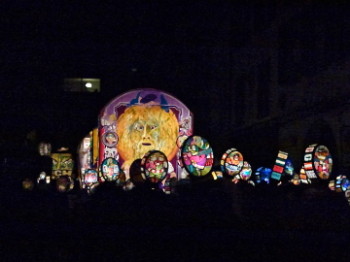
Participants are said to have a bowl of the traditional Basel Fasnacht dish – Mehlsuppe – before the procession. Many restaurants are open at 3 AM serving a very limited menu that includes this dish.
It translates, quite simply, to flour soup. And that is exactly what it is – a soup made with browned flour. While it sounds horrid and tasteless, when properly made, it is really delicious. A more accurate description of a good Mehlsuppe would be a hearty soup richly flavored with onions, beef broth, toasted flour, spices, sometimes red wine and topped with a good cheese. It is very similar to the world-renowned and extremely delicious French Onion Soup. Basel Mehlsuppe is slightly thicker due to the incorporation of toasted flour, the onions are only cooked a few minutes rather than slowly caramelized as in the French version, and it has fewer onions in ratio to the amount of liquid.
The key to making a good Mehlsuppe is using a rich beef stock and browning the flour to achieve a nutty, toasted flavor. Obviously, recipes differ but adding red wine, a bay leaf, cloves, nutmeg and marjoram elevate this soup to something special. A nice cheese such as Gruyere or Sbrinz is grated on top. Sometimes, to make it even heartier, a cheese-covered slice of bread is placed in the bottom of the bowl before ladling soup over it. A printable recipe can be found at the bottom. To hear more about this soup, click here to listen to a segment I recently aired on World Radio Switzerland.
Begin by placing flour in a dry pan over low heat.
After 5 minutes or so, the flour will begin to color.
Be sure to whisk or stir the flour every few minutes. It is very important not to burn the flour. If dark specks appear, throw it all away and start over. After about 10 minutes, it is even darker.
Brown the flour to a color anywhere between light brown and dark brown sugar. Taste it when it begins to darken to test if it is toasty and nutty flavored. I darken the flour more if my beef stock is light. In this case, my beef stock was dark and rich so I stopped cooking my flour at the light brown sugar-color phase and immediately removed it from the heat and dumped it onto a plate to cool. Do not leave it in the pan or it will continue to darken. (Note: flour can be browned well in advance and stored in an airtight container for several weeks.)
Dice onions. How-To guide.
Melt butter in a large pot over medium heat. Add onions.
Saute onions about 5 minutes until translucent. Stir in the bay leaf, a clove and nutmeg. Cook a few more minutes.
Add browned flour to the pot.
Stir until combined.
Stir in a small amount of beef stock. Whisk to combine with the flour onion mixture.
Add remaining stock.
Add red wine and marjoram.
Simmer gently, stirring occasionally, for about 15 minutes.
Optional, but delicious, is to place a piece of toasted, hearty bread at the bottom of the bowl. Top with a delicious, flavorful, finely-grated Swiss (non-stringy) cheese such as my favorites, Gruyere or Sbrinz.
Ladle soup over the bread (if using). Sprinkle with more cheese and enjoy!
- ⅓ cup / 3½ ounces / 100 grams flour
- 3 tablespoons butter
- 1 large onion, diced
- pinch of ground nutmeg
- 1 whole clove or a small pinch of ground cloves
- bay leaf
- ½ teaspoon marjoram (optional)
- salt and pepper, to taste
- 6 cups / 48 ounces / 1½ liters good quality beef stock or bullion
- ½ cup / 4 ounces / 125 ml red wine
- ½ to 1 cup grated Gruyere or Sbrinz (or other non-stringy, flavorful) cheese
- 1 slice of hearty, toasted bread per person (optional)
- Pour flour into a dry pan.
- Shake to evenly distribute.
- Cook over medium low heat, stirring and shaking every few minutes, until the flour reaches the color of light or dark brown sugar. If the beef stock is weak, use a more deeply toasted flour to boost the flavor. This might take anywhere from 15 to 30 minutes.
- Immediately after reaching the desired color, pour the flour onto a plate to cool. If left in the hot pan, it will continue darkening. If black specks appear during toasting, throw out the flour and begin again.
- Melt the butter in a large pot.
- Add diced onions and cook for about 5 minutes, or until translucent.
- Add nutmeg, clove and the bay leaf.
- Stir and cook for a minute.
- Dump in the flour and stir to combine.
- Add a small amount of beef stock and whisk until no lumps are left.
- Slowly whisk in the remaining beef stock.
- Add marjoram and red wine. Simmer for 15 to 3o minutes.
- Place a slice of toasted, hearty bread in the bottom of a soup bowl (this step is optional). Cover the bread with a layer of finely grated cheese.
- Ladle soup into individual bowls.
- Top with more grated cheese.
- Serve immediately.
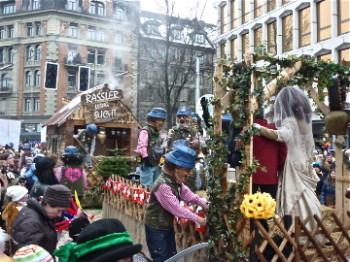

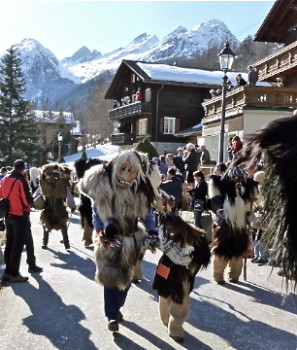
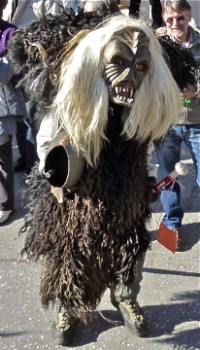
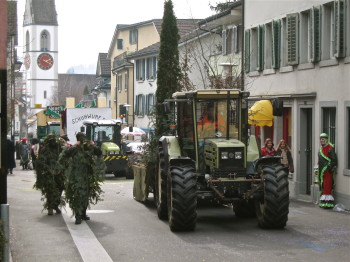
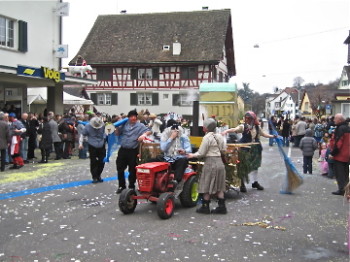
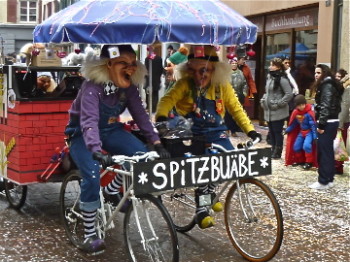
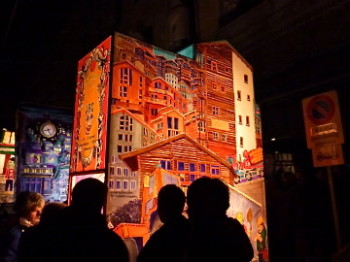

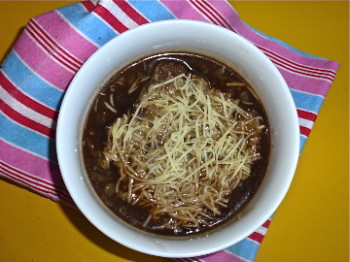
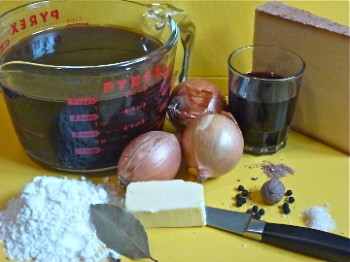
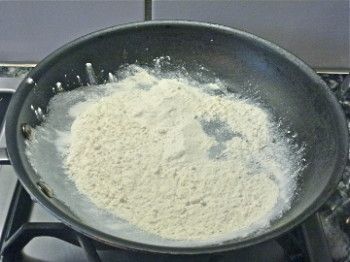
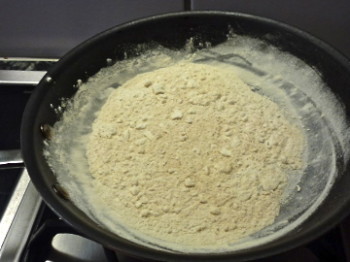
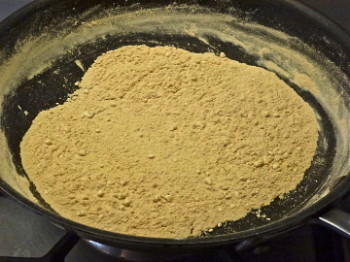
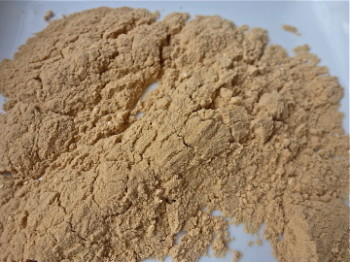
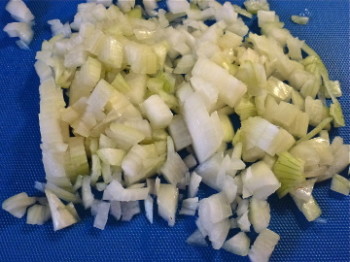
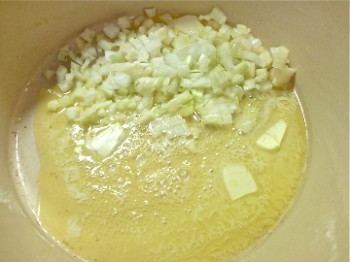
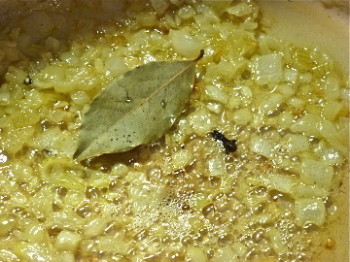
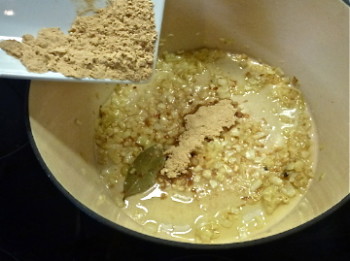
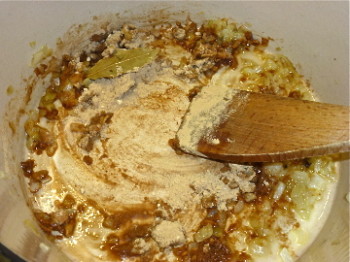
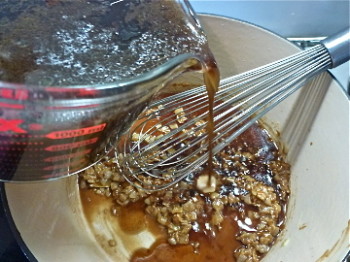
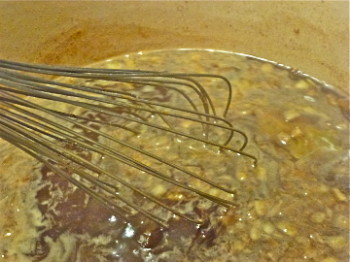
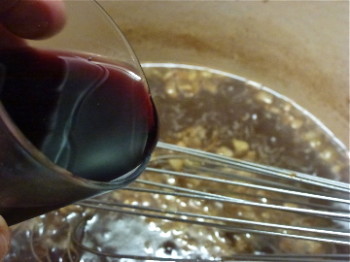
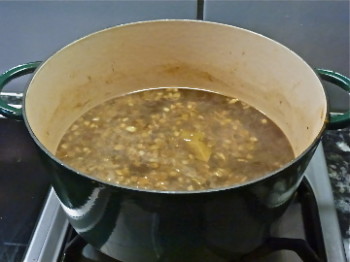
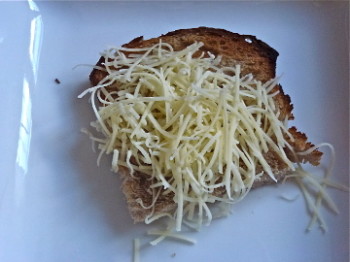
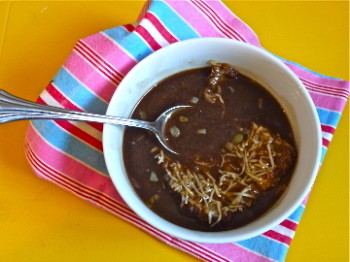





Thanks for this overview, and especially the Mehlsuppe recipe. Surely beats the Knorr-packet version! I will give it a try for Monday morning!
Great. I hope you like this version. I am not really a package soup kinda gal either!
Amy! Sounds great, can’t wait to try it in South Louisiana!!
Thanks, Karin. I was thinking about a good bowl of gumbo the entire Mardi Gras season. Just cannot get the right ingredients here, though. Megan had two versions waiting for me upon my arrival in Lafayette in January. Quite welcome after 3 flights and 19 hours of travel.
Amy
You are one of those great Americans who really learn and appreciate the customs and foods of other lands. You are missed here in Switzerland but it is a treat to see what you are cooking now that you are back in the US and recognize the influence the Swiss had on you. Love your pictures and the recipe. Think I have not browned my flour enough in the past! Warmest wishes,
Paula
Let wel op, met een elektrische fiets, fiets je meer.
Dit was ook een 28 inch met een laag frame.